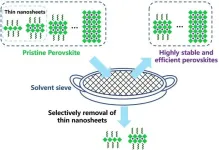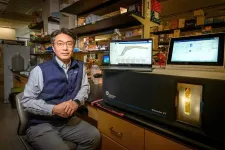(Press-News.org) Using a simple solvent sieve method, researchers from the Ningbo Institute of Materials Technology and Engineering (NIMTE) of the Chinese Academy of Sciences (CAS) have taken the lead in developing highly efficient and stable perovskite light-emitting diodes (PeLEDs) with record performance.
The study was published in Nature Photonics.
Perovskites are one of the most promising optoelectronic materials due to their excellent optoelectronic performance and low preparation cost. Compared with traditional organic light-emitting diodes (OLEDs), PeLEDs have a narrower light-emitting spectrum and superior color purity, thus showing great application potential in display and lighting.
However, despite significant progress in efficiency, low operational stability has long limited the practical application of PeLEDs. In particular, a limited understanding of the cause of perovskite instability has greatly hindered the development and commercialization of PeLEDs.
Based on an in-depth analysis of the fine nanostructures of perovskites, the researchers identified the perovskites’ defective low n-phase as the key source of perovskite instability. The low quality of the low n-phase, which contained only one or two layers of lead ions, originated from the rapid and uncontrollable crystallization process.
Inspired by the process of separating sand of different sizes with a sieve, the researchers proposed a solvent sieve method to screen out these undesirable low n-phases.
According to the researchers, the solvent sieve is a combination of polar and nonpolar solvents. The polar solvent acts as a mesh that interacts with perovskites, while the nonpolar solvent acts as a framework that does not affect perovskites. The researchers adjusted the ratio of polar solvents to effectively remove the defective low n-phases.
The PeLEDs based on the sieved perovskites achieved an operating lifetime of more than 5.7 years under normal conditions (luminance of 100 cd/m2), more than 30 times longer than the untreated device. This record lifetime is also the highest value reported to date for green PeLEDs, reaching the fundamental threshold for commercial application.
In addition, these PeLEDs achieved a record high external quantum efficiency (EQE) of 29.5%, significantly improving the efficiency of converting electricity to light.
When exposed to ambient air (50±10% humidity), the device can maintain 75% of its film photoluminescence quantum yield and 80% of its EQE for more than 100 days, thus showing excellent stability.
This solvent sieve method not only significantly improves the luminescence performance and stability of PeLEDs, but also paves the way for the future development and application of perovskites with unique nanostructures and excellent luminescence performance.
END
Solvent sieve method sets new record for perovskite light-emitting diodes
2024-02-05
ELSE PRESS RELEASES FROM THIS DATE:
Combination therapy lowers blood pressure in patients receiving ibrutinib
2024-02-05
(WASHINGTON, Feb. 5, 2024) – Combination treatments with two or more blood pressure drugs can significantly reduce blood pressure in patients taking ibrutinib, according to a new study published in Blood Advances.
Targeted drugs such as ibrutinib have improved outcomes for patients with cancers of the lymphatic system, but patients treated with ibrutinib and other drugs in its class often develop new or worsening high blood pressure (or hypertension or HTN). Few studies have examined how best to treat this potentially serious side effect, nor do any formal guidelines exist to steer doctors toward the most effective treatments.
“To ...
Ultra-sensitive lead detector could significantly improve water quality monitoring
2024-02-05
Engineers at the University of California San Diego have developed an ultra-sensitive sensor made with graphene that can detect extraordinarily low concentrations of lead ions in water. The device achieves a record limit of detection of lead down to the femtomolar range, which is one million times more sensitive than previous sensing technologies.
“With the extremely high sensitivity of our device, we ultimately hope to detect even the presence of one lead ion in a reasonable volume of water,” said Prabhakar Bandaru, a professor in the Department of Mechanical and Aerospace Engineering at the UC San Diego Jacobs School of Engineering. “Lead exposure is a serious health concern, ...
World’s largest childhood trauma study uncovers brain rewiring
2024-02-05
The world’s largest brain study of childhood trauma has revealed how it affects development and rewires vital pathways.
The University of Essex study – led by the Department of Psychology’s Dr Megan Klabunde – uncovered a disruption in neural networks involved in self-focus and problem-solving.
This means under-18s who experienced abuse will likely struggle with emotions, empathy and understanding their bodies.
Difficulties in school caused by memory, hard mental tasks and decision making may also emerge.
Dr ...
Number of shark bites consistent with recent trends, with small spike in fatalities
2024-02-05
There was an increase in the number of unprovoked shark attacks worldwide and an uptick in fatalities in 2023 compared to the previous year. The University of Florida’s International Shark Attack File (ISAF), a scientific database of global shark attacks, confirmed 69 unprovoked bites in 2023. Although this is higher than the most recent five-year average of 63 attacks, the data remain consistent with long-term trends.
Ten of the past year’s unprovoked attacks were fatal, up from five the year before, with a disproportionate number occurring in Australia. Although the country accounted for 22% of all attacks, ...
Schmidt Sciences awards $1.95M gift to Mount Sinai's Windreich Department of Artificial Intelligence and Human Health to establish The Eric and Wendy Schmidt AI in Human Health Fellowship Program
2024-02-05
New York, NY (February 5, 2024) — The Windreich Department of Artificial Intelligence (AI) and Human Health at the Icahn School of Medicine at Mount Sinai announced a transformative $1.95 million gift from Schmidt Sciences to create The Eric and Wendy Schmidt AI in Human Health Fellowship Program. The gift will support an inaugural cohort of five fellows over a three-year fellowship.
By leveraging AI and machine learning to tackle the increasing volume of data in health care, The Eric and Wendy Schmidt AI in Human Health Fellows will play a pivotal role in advancing medical research. ...
NFL PLAY 60 Fitness Break broadcast delivers movement minutes in advance of Super Bowl LVIII
2024-02-05
DALLAS, Feb. 5, 2024 — The American Heart Association and the National Football League (NFL), in collaboration with its 32 NFL clubs, are challenging kids to get moving and PLAY 60 in advance of Super Bowl LVIII with the latest installment of the NFL PLAY 60 Fitness Break broadcast series. On Thursday, February 8 at 1 p.m. ET/ 12 p.m. CT/ 10 a.m. PT the Association and the NFL will deliver an action packed, 15-minute synchronous broadcast to help students add movement to their day leading up to the big game along with ...
Microbial division of labor produces higher biofuel yields
2024-02-05
CHAMPAIGN, Ill. — Scientists have found a way to boost ethanol production via yeast fermentation, a standard method for converting plant sugars into biofuels. Their approach, detailed in the journal Nature Communications, relies on careful timing and a tight division of labor among synthetic yeast strains to yield more ethanol per unit of plant sugars than previous approaches have achieved.
“We constructed an artificial microbial community consisting of two engineered yeast strains: a glucose specialist and a xylose specialist,” said Yong-Su Jin, a professor of food science and human nutrition ...
Fencing young mussels for ecosystem restoration
2024-02-05
The restoration of mussel beds in the Wadden Sea or the Delta is a lot more successful when young mussels are helped a little with low, protective fences on the bottom. That is shown by research conducted by marine biologist Jildou Schotanus at the Hogeschool Zeeland / University of Applied Sciences in Vlissingen and at the Royal Netherlands Institute for Sea Research in Yerseke. She defends her thesis Restoring mussel beds on highly dynamic mudflats at the University of Groningen on Monday February 5th.
Ecosystem engineers
Mussels are so-called ecosystem ...
Mild Covid-19 infections make insomnia more likely, especially in people with anxiety or depression
2024-02-05
Although most patients diagnosed with Covid-19 will quickly recover, some people experience symptoms that linger well after they start testing negative again — including insomnia. Scientists already knew that insomnia was common in patients who had to be hospitalized, but a team of scientists led by Dr Huong T. X. Hoang of Phenikaa University, Vietnam began to wonder if mild infections might also affect sleep quality.
“As a sleep researcher, I received many questions and complaints from relatives, friends, ...
Winners of the 2024 Hill Prizes announced
2024-02-05
Hill Prize in Medicine Awarded to Martin M. Matzuk, M.D., Ph.D. (NAS), Baylor College of Medicine
Hill Prize in Engineering Awarded to Maria A. Croyle, Ph.D., The University of Texas at Austin
Hill Prize in Biological Sciences Awarded to Russell A. DeBose-Boyd, Ph.D. (NAS), UT Southwestern Medical Center
Hill Prize in Physical Sciences Awarded to Allan H. MacDonald, Ph.D. (NAS), The University of Texas at Austin
Hill Prize in Technology Awarded to Hermann Lebit, Ph.D., Alma Energy
February 5, 2024 – Austin – TAMEST ...





